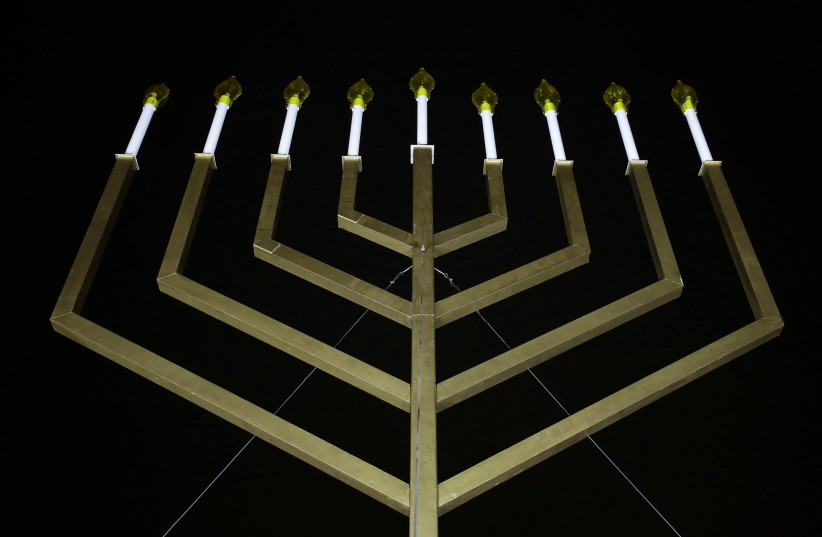I have been anxiously awaiting Hanukkah for quite some time now. Not just because I love presents, the delicious seasonal treats and the vibrant communal celebrations, but because I see the Festival of Lights as the perfect platform for enlightening my peers about their crucial roles in securing our Jewish future.
Hopefully, Jewish Gen Z can take a note from Hanukkah, which celebrates our national strength and publicizes a collective miracle, to find their voice, share their light with the world, and save Jewish philanthropy.
Within a few years, Gen Zers (like me) will be the directors of our schools, synagogues and community centers. We will be the dynamic do-gooders, the status quo-challenging change-makers, and the ones ensuring that the most vulnerable members of our communities are supported and empowered. But we can only carry the torch if we make a habit of sharing our motivations for doing good, ensuring that education becomes an indispensable part of our charitable actions.
The most outspoken leaders of my generation around the globe wouldn’t even think about completing a charitable action before informing others about their positive impact on society. Using social media as their stage, Gen Z influencers teach everyone who will watch about their chosen acts of kindness.
But they’re doing more than just amassing “likes.” They are transferring the power of giving to other charitable activists-to-be who can then become more intentional, purposeful and deliberate with their own actions.

ALTHOUGH MOST members of my generation follow this methodology, members of the tribe tend to operate on a different wavelength.
For us, compassion is part and parcel of Jewish life, so much so that we do acts of charity almost by rote. Children complete bnei mitzvah projects, teenagers volunteer at community organizations and adults give generous monthly tithes because that is just what’s done.
This is beautiful; giving is so deeply embedded in who we are as Jews. But we are forgetting the most important part of the process: education.
Only with a profound understanding of the “why” will these acts of kindness continue for generations. To truly impact society for the long term, we need to have real conversations about the kinds of giving that excite us, inspire us and move us all forward. Without education to fuel the fire of generosity, our Jewish joy for giving will fizzle over time.
I’VE FOUND that taking the time to publicize our passion projects is the best investment we can make – in our communities and ourselves. There is a fine line between bragging and inspiring, but we have no choice but to walk that line to ensure the survival of Jewish philanthropy.
Walking this line, I chose to do my National Service with ADI, an organization that cares for and empowers children and adults with severe disabilities, provides advanced rehabilitative care to anyone touched by disability, and puts a special emphasis on educating the masses about the importance of disability inclusion, equity and access.
Everyone at ADI Negev-Nahalat Eran and ADI Jerusalem could (and should) be bragging about their world-changing work all the time. For example, while I am one of the first National Service volunteers to work with patients undergoing rehabilitation at the Harvey and Gloria Kaylie Rehabilitation Medical Center at ADI Negev-Nahalat Eran in southern Israel, I try to help out in other areas whenever I can. With the weather getting colder, I pitched in to help the staff raise funds to purchase new winter clothing for our residents with severe disabilities.
Every WhatsApp message and e-mail I sent to friends and family became a conversation about what I was doing at ADI and, most importantly, why I was doing it. It was thrilling to recruit new supporters, but even more exciting to share my passion with others, encouraging them to find their own philanthropic spark.
I believe that the key to upgrading our culture of giving is to emphasize conversations about the causes we care so deeply about. Donating, volunteering and putting in the physical work are no longer enough. To effect change, we must explain why we feel so strongly about the impact we are making in the world.
Jewish Gen Z is bright, determined and dynamic. But if we don’t illuminate our charitable motivations and rally our community around mindful giving, we may soon find that there is no community left for us to lead.
The writer made aliyah from Houston and is a National Service volunteer at ADI, an Israeli organization which empowers children and young adults with severe disabilities, and provides cutting-edge therapeutic and recovery services for those touched by disability. Learn more at: www.adi-israel.org.
